DAVAO CITY (MindaNews / 26 July) – President Rodrigo Roa Duterte will deliver his sixth and last State of the Nation Address (SONA) at 4 p.m. on July 26, exactly three years to the day he signed into law Republic Act 11054 or the Organic Law for the Bangsamoro Autonomous Region in Muslim Mindanao (BARMM), the enabling law of the peace agreement that government signed with the Moro Islamic Liberation Front (MILF) in 2014.
But will the President say anything about the fate of the Bangsamoro region whose establishment in 2019 is being touted as a legacy of his administration when he steps down on June 30, 2022 or will he keep silent about it in his last SONA given that he has declared his “neutral” stance on the bills seeking to extend the transition period to three more years by resetting the election of the 80-member Bangsamoro Parliament to May 2025 instead of May 2022?
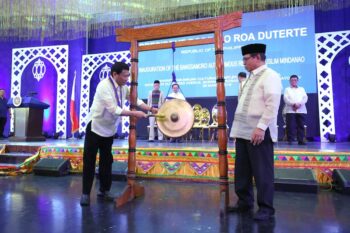 President Rodrigo Roa Duterte sounds the gong to signal the inauguration of the Bangsamoro Autonomous Region in Muslim Mindanao (BARMM) at the Shariff Kabunsuan Cultural Complex in Cotabato City on March 29, 2019, marking what he said was a “new dawn” for the Moro.’ Joining the President is BARMM interim Chief Minister Ahod Balawag Ibrahim (MILF chair Al Haj Murad Ebrahim). ROBINSON NIÑAL JR./PRESIDENTIAL PHOTO
President Rodrigo Roa Duterte sounds the gong to signal the inauguration of the Bangsamoro Autonomous Region in Muslim Mindanao (BARMM) at the Shariff Kabunsuan Cultural Complex in Cotabato City on March 29, 2019, marking what he said was a “new dawn” for the Moro.’ Joining the President is BARMM interim Chief Minister Ahod Balawag Ibrahim (MILF chair Al Haj Murad Ebrahim). ROBINSON NIÑAL JR./PRESIDENTIAL PHOTO
Will Duterte pass on to the next administration a still to be completed implementation of the peace agreement or will his administration and the MILF sign an Exit Document “officially terminating the peace negotiation?”
The Framework Agreement on the Bangsamoro (FAB) signed in October 2012 and made part of the Comprehensive Agreement on the Bangsamoro (CAB) in 2014, provides that at the end of the transition period, the government and MILF peace negotiating panels, together with the Malaysian Facilitator and the Third Party Monitoring Team (TPMT), “shall convene a meeting to review, assess or evaluate the implementation of all agreements and the progress of the transition.”
The TPMT is an independent body set up by the Philippine government and the MILF to monitor the implementation of the CAB.
According to the FAB, an Exit Document officially terminating the peace negotiation may be crafted and signed by both parties “if and only when all agreements have been fully implemented.”
Congress adjourned sine die on June 3 without passing Senate Bill 2214, the substitute to the Pimentel and Gordon bills. The Senate, however, was wrapping up its period of interpellation when it adjourned.
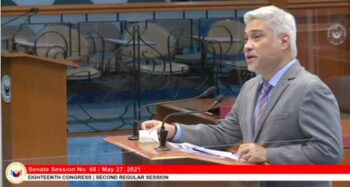 Senate Majority Leader Juan Miguel proposes a “win-win solution” on the Bangsamoro transition. Screengrabbed from Senate live-streamed session
Senate Majority Leader Juan Miguel proposes a “win-win solution” on the Bangsamoro transition. Screengrabbed from Senate live-streamed session
Senate Majority Leader Juan Miguel Zubiri told the Bangsamoro Governance Summit on Friday in a message delivered via Zoom that in the Senate, they are on the “final stages of passing the Bill, postponing the BARMM elections, so that you will be able to deliver your promises to our people of this elusive peace and prosperity.” He assured Summit participants that “within a month’s time, we will get it done.”
In the House of Representatives, the three committees — Suffrage, Muslim Mindanao Affairs, and Peace, Reconicliation and Unity — which canceled a joint committee hearing in March, held one in June.
Presidential spokesperson Harry Roque announced during a press briefing in Malacanang on June 28 that the President had decided to be “neutral” and had asked Congress to decide whether or not to extend the transition period in the Bangsamoro.
Asked if the “neutral” stance means President Duterte will not certify the bill as urgent, Roque told MindaNews: “yes.”
On November 26, 2020, Presidential Peace Adviesr Carlito Galvez told a committee hearing in the House of Representatives that President Duterte wanted Congress to extend the transition period until 2025.
Civil society groups launched a signature campaign early this year urging the President to certify the transition bills as urgent. Signed by over a million persons, the petition was submitted to Malacanang on March 18. Catholic religious leaders, among them Mindanao’s lone Cardinal, Orlando B. Quevedo, and Cotabato Archbishop Angelito Lampon, also issued statements in support of extension.
“Not later than July”
At the Senate committee hearing in May, Rex Laudiangco, director of the Commission on Elections’ law department, reiterated what Comelec chair Sheriff Abas said in a meeting in Davao City in early 2021 that “our only position is to request that any legislative action be made not later than July because we are nearing the crux of preparations for the 2022 elections” and the filing of COCs would require “configuration of software and hardware.”
Between November 2020 and June 2021, a series of meetings was held among Bangsamoro leaders and Cabinet officals as well as leaders of both houses of Congress on the extension bills — in Cagayan de Oro City, Davao City, Manila and Malacanng.
Roque told MindaNews that during the Bangsamoro Council of Leaders’ meeting on June 23, “no consenus (was) reached.” At present, the Council is composed of the Bangsamoro Chief Minister, five provincial governors, three city mayors and eight congressional district represenatives.
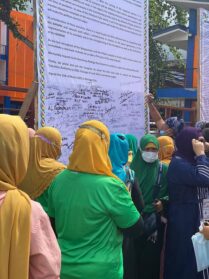 Participants of a peace caravan sign a manifesto during a short stop in Matling, Malabang in Lanao del Sur on Saturday, 12 March 2021, urging President Rodrigo Duterte to certify as urgent the bills seeking to extend the transition period in the Bangsamoro Autonomous Region in Muslim Mindanao for another three years from 2022 to 2025. (Photo courtesy of Ariel Amerol, Bangsamoro Development Agency)
Participants of a peace caravan sign a manifesto during a short stop in Matling, Malabang in Lanao del Sur on Saturday, 12 March 2021, urging President Rodrigo Duterte to certify as urgent the bills seeking to extend the transition period in the Bangsamoro Autonomous Region in Muslim Mindanao for another three years from 2022 to 2025. (Photo courtesy of Ariel Amerol, Bangsamoro Development Agency)
But Defense Secretary Delfin Lorenzana, who presided over the Political Leaders’ meeting held immediately after the Council of Elders’at the Grand Hyatt Manila, told MindaNews that “the majority present voted for extension.” He said only Sulu Governor Sakur Tan was against extension and gave notice that if Congress passes a law extending the transition period, he will contest it in the Supreme Court.
Lorezana said he continues to support extension of the transition period.
Four of the five provincial governors in the BARMM – Basilan’s Jim Hataman, Lanao del Sur’s Mamintal Adiong, Jr., Maguindanao’s Bai Mariam Mangudadatu, and Tawi-tawi’s Governor Yshmael Sali reiterated their support for extension. Resolutions were earlier filed by their provincial board and leagues of mayors in support of extension.
Though not a member of the Bangsamoro Council, North Cotabato Governor Nancy Catamco was in the June 24 Malacanang meeting and reiterated her support for extension. Sixty three barangays in North Cotabato had voted for inclusion in the Bangsmaoro region during the plebiscite to ratify RA 11054 in early 2019.
The BARMM comprises the provinces of Basilan, Sulu, Tawi-tawi, Maguindanao and Lanao del Sur, the cities of Marawi, Lamitan and Cotabato, and the 63 villages in North Cotabato.
Tan reiterated his objection to extension, preferring that the the parliamentary elections push through as scheduled. Cotabato City Mayor Cynthia Guiani also wants an election while Mayors Rosita Furigay of Lamitan in Basilan and Majul Gandamra of Marawi in Lanao del Sur, are for extension.
Tan and Guiani campaigned against the ratification of RA 11054 or the Organic Law for the BARMM, in January 2019. Tan had earlier filed a petition seeking to declare RA 11054 unconstitutional while Guiani’s camp filed a protest on the results of the plebiscite. Cotabato City voted for inclusion in the BARMM in a plebiscite Guiani described as “marred with violence and intimidation.”
The Bangsamoro law was ratified, paving the way for the creation of the BARMM and the abolition of the 29-year old Autonomous Region in Muslim Mindanao.
In accordance with the peace agreement and the Bangsamoro law, Duterte appointed 80 members of the Bangsamoro Transition Authority (BTA) — 41 nominated by the MILF and 39 nominated by government. The BTA is the body tasked to govern the BARMM until the end of the transition period on June 30, 2022.
The BARMM was inaugurated on March 29, 2019 with Duterte declaring a “new dawn for the Bangsamoro.”
Eight months ago
At the Malacanang press briefing on June 28, Roque said the President decided to “become netural” after meeting the Bangsamoro leaders on June 16 and 24 “and will allow Congress to fully discuss the matter and to decide accordingly, respecting the plenary powers and wisdom of Congress.”
On November 23, 2020, Duterte and six of his Cabinet members met with the BARMM’s interim Chief Minister, Ahod Balawag Ebrahim and his delegation at the Matina Enclaves in Davao City, where the decision to ask Congress for an extension was made.
On November 26, Presidential Peace Adviser Galvez told the hearing of the the House Committee on Peace, Reconciliation, and Unity on the status of implementation of the 2014 Comprehensive Agreement on the Bangsamoro (CAB), that Duterte wants Congress to extend the Bangsamoro transition period “to enable the (BTA) to fulfill its mandate in a most reasonable time.”
The CAB is the peace agreement signed by the Philippine government and the Moro Islamic Liberation Front (MILF) on March 27, 2014 after 17 years of negotiations.
“The President believes that three years is too short and he agrees for the possible extension of the BTA up to five to six years” (2024 to 2025) Galvez said, adding the COVID-19 pandemic also affected the work of the BTA.
Extension, however, requires legislation and with so little time left – at that time, only 11 months to the filing of certificates of candidacy for the May 9, 2022 elections – a Cabinet Secretary proposed that this be attended to immediately, even proposing a timetable for the bill to be passed hopefully before Congress would take a break in March 2021.
Within the month of December 2020, five bills were filed in the House of Representatives seeking extension of the transition period, including one filed by House Majority Leader Ferdinand Martin Romualdez
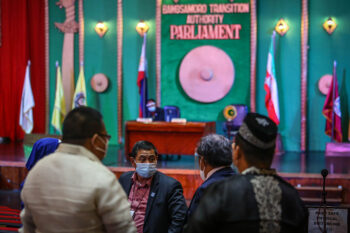 Members of the Bangsamoro Transition Authority discuss the fate of the proposed Bangsamoro Administrative Code during special session at the Shariff Kabunsuan Complex in Cotabato City on Wednesday (28 October 2020), complete with face masks and shields as the whole world deal with the spread of the coronavirus disease (COVID-19). MindaNews photo by FERDINANDH CABRERA
Members of the Bangsamoro Transition Authority discuss the fate of the proposed Bangsamoro Administrative Code during special session at the Shariff Kabunsuan Complex in Cotabato City on Wednesday (28 October 2020), complete with face masks and shields as the whole world deal with the spread of the coronavirus disease (COVID-19). MindaNews photo by FERDINANDH CABRERA
In the Senate, two bills were filed in January by Senator and former Senate President Aqulino Pimentel III and Richard Gordon.
The President was expected to certify the transition bills as urgent.
Duterte met with the Bangsamoro leaders several times last year and this year on the issue of extension. A covenant was supposed to have been signed in March in Manila as a follow-through of what was agreed upon in Davao City on February 27 but Tan said a legal opinon should be sought first whether or not postponing the election to May 2025 would require a plebiscite.
In the meeting on June 16, the President asked the Moro leaders in the presence of some Cabinet officials to convene the Bangsamoro Council of Leaders so they could discuss among themselves and return to Malacanang on June 24.
Plebiscite?
According to Roque, the President said both sides have their own points, that those who seek extension said it is difficult to have an election because there is no Bangsamoro Electoral Code as yet and no law yet on re-districting, while those who are for election say it is important for the political leaders to have a mandate so they will have moral authority to lead. “Kaya iniwan na po ni Presidente sa Kongreso ang desisyon” (so the President left it to Congress to decide).
The Bangsamoro law provides that elections in the BARMM will be governed by the Bangsamoro Electoral Code. The proposed Code is still at the Cabinet level, for filling in the Parliament, according to Bangsamoro Education Minister Mohagher Iqbal, concurrently the peace panel implementing chair for the MILF.
Roque told MindaNews that “per (Governor) Tan et al, code can be rushed. Districts can be as is with amendments to be done in future.”
Iqbal said it took the Parliament about eight months to pass the Bangsamoro Education Code, a law he described as “not politically charged” as an electoral code that would involve redistricting, among others.
“Point of impossibility”
The Bangsamoro Parliament that will be voted if elections were to push through on May 9, 2022 has 80 seats: 40 representing political parties, 32 single member parliamentary districts, and eight reserved seats and sectoral represenatives:
two reserved seats each for non-Moro Indigenous Peoples and settler communities; and one seat each sectoral representation of women, youth, traditional leaders, and the Ulama.
On May 31, Senator Francis Tolentino, chair of the Senate Committee on Local Goverments and principal author of SB 2214, made a manifestation before the plenary that “it would appear that we have reached a stage where it is really impossible for us right now to arrive at a conclusion wherein legislation would result in an election.”
He cited three pathways that lead to no election of the Bangsamoro Parliament in May 2022. He said if Congress does not act on the bills, “definitely, there is not going to be an election;” if Congress disapproves the proposed measure, “the endgame is no elections” in May 2022; and if they approve the measure, “the result will be no elections but certainty as to when the next elecitons would be,” he said, referring to May 2025.
He said he premised his manifestation on, among others, the Bagsamoro law that provides that the first regular elections should be conducted pursuant to the Bangsamoro Electoral Code “which we still don’t have so how can we have an election when there are no rules to apply;” that parliamentary districts “have yet to be apportioned,” and therefore “there is no office to aspire for” and no Certificate of Candidacy “that would be congruent to a vacant parliamentary district” as the Bangsamoro Electoral Code has yet to identify the parliamentary districts.
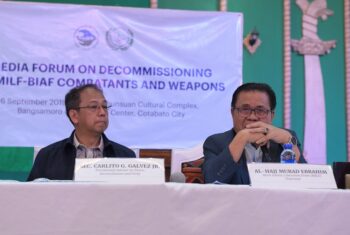 Presidential Peace Adviser Carlito Galvez. Jr. and Ahod Balawag “Al Haj Murad” Ebrahim, interim Chief Minister of the Bangsamoro Autonomous Region in Muslim Mindanao and concurrent chair of the Moro Islamic Liberation Front answer questionson the decommissioning of MILF combatants and firearms in a media forum at the BARMM compound in Cotabato City on Friday, Sept. 6, 2019. MindaNews photo by FROILAN GALLARDO
Presidential Peace Adviser Carlito Galvez. Jr. and Ahod Balawag “Al Haj Murad” Ebrahim, interim Chief Minister of the Bangsamoro Autonomous Region in Muslim Mindanao and concurrent chair of the Moro Islamic Liberation Front answer questionson the decommissioning of MILF combatants and firearms in a media forum at the BARMM compound in Cotabato City on Friday, Sept. 6, 2019. MindaNews photo by FROILAN GALLARDO
Roque also said that Duterte asked the opinion of the Presidential Chief Legal Counsel Salvador Panelo and Justice Secretary Menardo Guevarra whether or not a plebiscite is needed in amending RA 11054 and Panelo said a plebiscite was needed while Guevarra said there was no need for a plebiscite.
“So within the Cabinet itself eh two different opinions were expressed and I think that was also one reason why the President said magnu-neutral siya. He is asking Congress to consider all sides and he has asked Congress to exercise its wisdom ‘no kung kinakailangan talagang ma-extend o hindi iyong transition,” Roque said.
“But that’s not for Congress to decide, right?” MindaNews asked Roque.
“Congress should have its own legal position but SC (Supreme Court) will decide with finality,” he said.
Senator Tolentino has repeatedly invoked the Supreme Court ruling in Kida vs Senate that provides, among others, that there is no need for a plebiscite to reset the date of the elections.
On May 31, when Senate Minority Leader Franklin Drilon also cited Kida vs Senate and said the Constituion does not require a plebiscite to be had for all amendments to the organic law but only requires it on amendments or revisions that are “constitutionally essential to the cration of autonomous regions and the date of the first regular elections does not fall under this category,” Tolentino said he agreed with Drilon.
“There is no need for a plebiscite to postpone the (Bangsamoro parliamentary) elections. On the contrary, if we conduct an election in 2022, there might be a need for a plebiscite,” he said, noting that pushing through with an election without a Bangsamoro electoral code “will be affecting structurally the Bangssamoro OrganicLaw.”
Extension issue
The reasons cited by Roque during the June 28 pres sbriefing, reduced the issue of extension to a mere choice between pushing through with the parliamentary election in May 2022 or not. The issue of extension, however, is not just an issue of postponing the election but of determining if, indeed, an extension is needed to allow both the regional and national governments to comply with and honor their commitments under the peace agreement and the Bangsamoro law.
The BARMM is a product of a law that was based on a peace agreement entered into by two parties and whose implementation of the political track and the normalization track that includes decommissioning of weapons and combatants, also requires both parties.
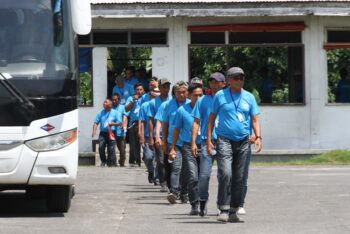 Members of the Moro Islamic Liberation Front’s Bangsamoro Islamic Armed Forces (BIAF) who will be decommissioned arrive at the Old Capitol complex in Simuay, Sultan Kudarat on Saturday, September 7, 2019, for the launch of the second phase of the decommissioning process. MindaNews photo by MANMAN DEJETO
Members of the Moro Islamic Liberation Front’s Bangsamoro Islamic Armed Forces (BIAF) who will be decommissioned arrive at the Old Capitol complex in Simuay, Sultan Kudarat on Saturday, September 7, 2019, for the launch of the second phase of the decommissioning process. MindaNews photo by MANMAN DEJETO
In the peace agreement with the Moro National Libeation Front (MNLF), demands for “full implementation” of the 1976 Tripoli Agreement and 1996 Final Peace Agreements hounded all administrations from Marcos to Duterte.
The BARMM is the third autonomous region set-up in the predominantly Moro areas in the past four decades but the first to adopt a parliamentary system within a highly-centralized Presidential system of government.
A mid-term review of the three-year transition conducted by the Mindanao Peoples Caucus and released in October last year listed accomplishments of the BARMM, ongoing programs and legislation and what have yet to be done, and, citing results of focus group discussions, recommended an extension of the transition period until June 2025 to allow the BTA and the national government “sufficient time to fully accomplish their priority tasks and duties especially those that need to be jointly implemented.”
The Third Party Monitoring Team (TPMT), an independent body set up by the Philippine government and the MILF to monitor the implementation of the CAB told a virtual press conference on December 14 that the peace process is “fundamentally on track” with the establishment of the BARMM as a “very big achievement” but noted that some elements “will require more time to complete.”
Speaking from Brussels, TPMT chair Heino Marius, said it is beyond the mandate of the TPMT to recommend an extension of the three-year transition period as that matter has to be decided upon by both parties, but asked if “more time” means “beyond June 30, 2022,” he replied “yes.”
He said the remaining challenges mentioned in their report “tend to show that the time allocated to the transition period is very tight and the ongoing COVID-19 pandemic has considerably complicated the picture” and as a consequence, “it has become clear that many elements which form part of the peace process,” particularly the normalization track, “will in all likelihood require time beyond May 2022.”
RA 11054, the Organic Law for the BARMM, mandates the BTA to pass as priority legislation the Administrative, Education, Electoral, Local Government and Revenue codes.
Iqbal said the Revenue Code is a “very technical code and we believe it will require much consultations, hearings and engagements with experts and other resource persons.”
The Bangsmaoro Parliament has passed the Administrative Code, Civil Service Code and Education Code. (Carolyn O. Arguillas / MindaNews)
